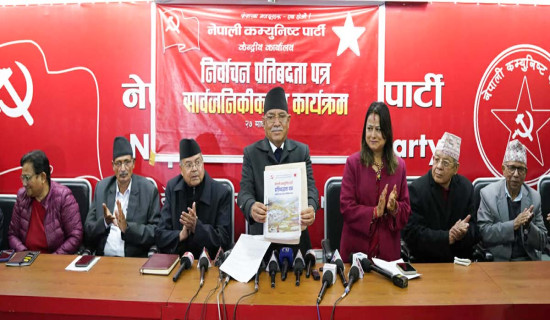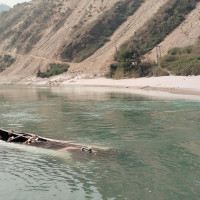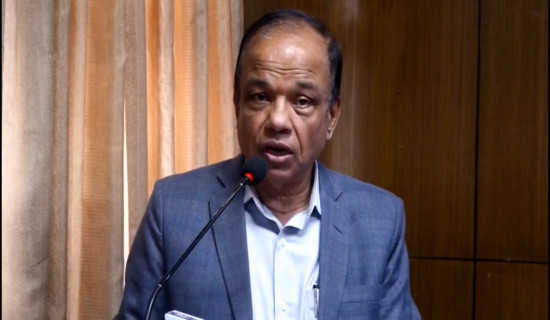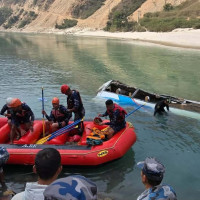- Wednesday, 11 February 2026
Subset Of Conflicts Linked To Global Powers
The Russia-Ukraine, India-Pakistan and Israel-Iran conflicts are subsets of larger geopolitical struggles shaping the dynamics of world politics. Geopolitical thinkers believe that China has emerged as a security, economic and technological competitor of the sole superpower. It holds leverage on the geopolitical struggles and strongly supports its allies, which may prolong the war of attrition so that the US grand strategy and its allies cannot fully pivot the Conflict Theater to the Indo-Pacific region and avert China’s integration of Taiwan by 2027. The US carriers, thousands of soldiers and artillery are moving from the South China Sea to the Middle East in Qatar, Iraq, Bahrain and the Arabian Sea to attack Iran at the call of Israel. Iran may have a sleeper cell inside the US, which can be activated in case of a US attack.
The domestic turmoil, Congressional and Court’s restrictions and opposition politics are prompting US President Donald J Trump to suggest Israel and Iran pull back from the war offensive and begin diplomacy, to which Iran demanded an immediate halt to Israeli attacks. He has offered Iran an incentive to remove all sanctions if it drops its nuclear program and chooses peace. China deems Taiwan’s integration vital to break the invisible chains of security created by the US and its allies around several islands of the Pacific, the formulation of the Indo-Pacific Strategy, QUAD and AUKUS alliance of English-speaking nations, control the production of semiconductors and secure its peace and prosperity.
Multi-axial dimension
Under the trade deal, China has agreed to resume the flow of rare earth minerals and magnates essential for civilian and military manufacturing to the US in return for the lifting of export restrictions on chip software and jet engines. China sees Brazil, France, Turkey, Saudi Arabia, South Africa, Mexico and Canada moving away from the US in defense, trade and diplomacy and deepening ties with it. Vietnam and India, both manufacturing powerhouses, are, however, caught in the cross-pressure of the USA and China and seeking not the rejection of the West but a hedge to ensure strategic autonomy. The acceptability of any great power rests on how it balances the multi-axial dimension of world politics and engages them in mutually beneficial payoffs.
The Asian nations are affected by the US deportation of their citizens, imposition of reciprocal tariffs and cut of foreign aid. In the QUAD ministerial meeting, US Secretary of State Marco Rubio pledged to reduce dependence on China on rare earth minerals, avoid supply chain disruption, make the Indo-Pacific free and open and prioritise the like-minded nations to counter China. India's plan to sign a 10-year Defense Framework with the US is deemed by India’s Minister for External Affairs S. Jayashankar, “the most consequential pillar of the relationship in the Indo-Pacific.” Europe’s Russophobia will occupy its priority to Ukraine’s freedom of choice to join NATO, while the US priority lies in Israel’s survival, a keystone of American foreign policy in the Middle East and frontline defense of Western civilisation.
Iran has suspended cooperation with the International Atomic Energy Agency and has shown determination to pursue nuclear projects for peaceful purposes. China, Pakistan, Russia, North Korea, Turkey and Afghanistan are acting as a deterrent against Israeli-American attack, while North Korea is eager to supply nuclear weapons. The Gulf nations are trying to halt the war. Thinking that the US is controlled by a deep state, Russia cares less about its rhetoric of negotiation and seems ready to confront NATO. The Russian supply of 24 SU-35, Chinese delivery of 40 advanced J-10 C fighters and Pakistan’s air defense to Iran have strengthened its military muscle. Turkey and Saudi Arabia’s air defense systems are bolstered by Russia, while that of Egypt is by China.
India is unhappy over American military aid to Turkey and supplying its S-400 missiles to Greece, at Turkey‘s discomfort for its support to Pakistan. Both the US and China think of Pakistan as a friend and do not share the Indian lens about Pakistan’s Baluchistan and Myanmar mess. Israel and the US support Kurdish rebels in Turkey, Syria, Iraq and Iran so that they are strained by domestic turmoil and thus lack the will and capacity to indulge in anti-Israel and anti-US activities. NATO’s bellicose attitude against Russia will beef up the latter's ties with China, India, Iran, North Korea, SCO, and BRICS members and their purchase of oil, gas and weapons will provide it an economic lifeline to bolster its military competence. NATO members’ purchase of US weapons to an unlimited supply to Ukraine may spiral the war to a catastrophic scale and disrupt the resetting of US-Russia relations. Hungary and Italy are troubled over NATO’s combative mood.
The American imperial ambition to integrate Canada and Greenland and control maritime routes haunts President Trump as he is feeling uneasy over Canada outplaying him in power politics by developing ties with the EU and China. Even Mexico desires military and economic cooperation from China, much to its disappointment. One obvious fact is that neither the US, nor China, nor even Russia is capable of defeating and dominating each other, nor does their zero-sum game create a modicum of global governance. Peace can prevail if each of them realises their collective responsibility for global security, cooperation and peace and learns to coexist so that sub-set conflicts do not boil into a broader great power dynamic.
The dynamics of world politics are shaped not only by shifting alliances but also by cutting-edge technologies, communication, manufacturing, and production of sophisticated weapons to expand one’s influence, fill the vacuum of power left by American alienation from multilateralism, the UN and WTO. Great powers can acquire respect if they act to respond to international conditions, laws and institutions and not pursue their own selfish interests to conform their transactional leaders’ private passion devoid of the moral wisdom of statesmen. In a world of interlocking challenges including arms race and climate change, pursuit of unilateralism and exercise of power disproportional to responsibility can easily cripple the authority of international institutions and degenerate world politics to the state of nature. If great powers maximize their absolute security, others evolve a bent to either free ride, remain indifferent or seek adaptive responses.
Global dynamics have changed the axis of power. Pan-African sentiment unleashed by the decolonisation movement is diverting Africa from the Atlantic world to Asia. Latin America, Europe, Canada, Mexico and Central Asia are redefining their ties with Asia and have shown interest in joining BRICS, the vehicle of the Global South to evade American domination and keep policy autonomy. President Trump has threatened new tariffs on nations supporting anti-American policies of BRICS and its plan to ditch the US dollar. The 17th BRICS summit criticised the coercive tariffs of the US and the US-Israeli attack on Iran’s nuclear sites by violating international law, while favouring a two-state solution against Israeli Prime Minister Benjamin Netanyahu’s fear, “A Palestinian state would destroy Israel.”
The growth of new poles of power has incubated a multi-polar world order. India prefers the reforms of global governance, applying the principle of inclusiveness. The trust deficit in the US leadership is prompting many nations to diversify their ties while Germany and Italy withdraw their gold from the US. It can reduce the dollar's value, weaken the current global economic order and generate global economic woes. China and the EU can benefit from the American alienation from the global trading system. Both the EU and China need each other to offset the impact of higher tariffs on the US: the former can get investment from the latter, better access to its domestic market and bolster defense spending of 5 per cent if they remove the obstacles, including subsidies.
For the EU, North America and Latin America, China can offer an alternative to the US for its relative advantages in the manufacturing of textiles, home appliances, EVs, AI innovation, solar panels, ship building, rare earth minerals, powerful drones and battery technologies. China’s BRI links it with Pakistan, Afghanistan, Iran and Central Asia. Pakistan and Russia are boosting rail links for warm water access and Central Asian markets. Fifty-three nations of Africa have signed a tariff-free trade pact with China, providing them access to its markets. It is the biggest trading partner of the entire African continent, like Southeast Asia. China and the Gulf Cooperation Council are also boosting their free trade.
China’s Indian Ocean Forum includes 23 littoral and landlocked nations, including Nepal and covers the straits of Malacca, Hormuz, Gwadar and Djibouti, the major sea trade routes. It has many projects to boost the blue economic capabilities of member nations, including climate change and sustainable development. During the pandemic, China had organised webinars of small South Asian nations and shown interest in creating an alternative to SAARC, which is moribund now, owing to the shifting interest of India from SAARC to BIMSTEC. As India is not included in China’s Indian Ocean Forum, it is promoting the Indian Ocean Rim Association for inclusive development. Nepal attends both the forum and the association.
The US effort to use India as a counterbalance to China may not work owing to India's imports of Chinese goods. Sino-Indian trade stands at $136.2 billion. The Indian government is sensitive over its huge trade deficits with China, its support to Pakistan and Bangladesh, with whom it has an uneasy relationship and border security, although both are tied by SCO, BRICS and the agenda of the Global South. India, however, prefers a policy of multi-alignment rather than de-linking. This is the reason it does not support the policy of de-dollarization and was silent when Israel and the US attacked Iran.
The Chinese government is sensitive over India hosting Taiwan’s office, acting as a de facto embassy since 1995, publicly supporting the Dalai Lama’s right to determine his successors and seeking to reduce Indus River water for Pakistan in response to a deadly attack of terrorists on Indian tourists in April for which India blames Pakistan. In the recent India-Pakistan brief war, China supported Pakistan and used the Brahmaputra leverage against India, threatening it to divert water if it continued to block water to Pakistan. The outstanding issues between the Indo-US trade deal stand on 50 per cent tariffs on steel and aluminum and 25 per cent on electric vehicles and India's defiance of the American objection to purchase Russian oil, gas and weapons for its national defense and development.
Economic diplomacy
Small states are trying to adapt, rather than retreat from this world order where economic diplomacy is aligned with geopolitics. Nepal is struggling to adopt an excruciating balancing act, uphold the creditworthiness of the nation for foreign aid, investment and employment and secure its identity and independence in world politics. The fourth international conference on Finance for Development in Spain on June 30 indicated the declining interest of developed nations in aid as they are heavily indebted, face economic decline and pressure for defense buildup.
The BRICS nations have set up an investment fund for member states managed by China’s New Development Bank to serve as an alternative to the World Bank. In this context, Nepal will continue to face development constraints and security dilemmas if its ties with its neighbours and several poles of power remain slanted. It is geo-strategically positioned to play a vital role but its economic vulnerability and political instability require its leadership to devise tangible measures for an adaptive response to value-free geopolitical trends and reap the opportunity to outsize its diplomacy in the global power dynamics.
(Former Reader at the Department of Political Science, TU, Dahal writes on political and social issues.)





-square-thumb.jpg)


-square-thumb.jpg)








